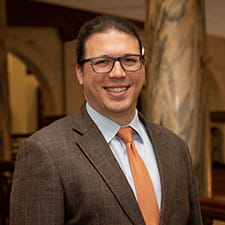onward
 By Marc Vallone
By Marc Vallone
We have moved into 2021, and there is good reason to be hopeful. It brings a smile to my face to write this because, truthfully, there has been little that has brought me a smile lately.
I don't want to spend too much space here on the struggles of this period in our lives. We all have been battling our own Balrog...personally, professionally, or academically. I certainly became Zoom-zonked while meeting our international students virtually: It turns out "visiting students" is not as enjoyable from your makeshift at-home office at four o'clock in the morning. But when I reflect on our work over the past year, I can't help but think about how one of my colleagues signs off on emails:
"Onward."
For we have no choice, right? How bizarre it would it be to read a communication ending with "Backward!" This past year, I have seen "onward" in action. At Drexel, we have adapted and developed, shifting nearly every aspect of what we offer, and yes...even shifting our sleep schedules to accommodate our future Dragons. We changed our work to meet students where they are: physically, academically (test optional!), emotionally, and socially. We created a completely new admissions entry program to accommodate students who wanted to join us in the winter term. And, for the Liberty Scholars program, we opened doors to students beyond the borders of Philadelphia. We had no choice.
And you responded! Undeterred students enrolled remotely, staying the course even as it shifted, took several detours, and realigned itself with external forces and realistic expectations. Taking both synchronous and asynchronous courses remotely certainly has its benefits and pitfalls, but wherever one stands in online education, there are real opportunity costs with taking an "onward" approach in higher education.
Several years from now, when students tasked with deciding their future out of secondary school may be graduating from universities, it will be a completely different landscape.
In a previous life, I was a high school administrator and part-time faculty member. I have talked to many still working in schools, and in a hazy year filled with conversations about what was, what is, and what will be, I have yet to find one teacher or staff member who denies the value of in-person learning...but those same people struggle with hitting a giant PAUSE button on education.
"It is really hard to stop [formal education] and start again," one former colleague of mine said. Outside of just getting back into a groove of taking classes, he posited that "students opting to wait a year [to enroll] might face a tougher climate when graduating." We talked about that for at least an hour...what were those obstacles? To find an answer we needed to look beyond the immediate decision at hand.
If I haven't lost your attention yet, I will try to be brief. The conversation was sprawling but, in summation, we agreed the impact of this year has yet to be fully realized. Some industries have been crippled while others have had overnight success. Regardless, 2020 already happened. Several years from now, when students tasked with deciding their future out of secondary school may be graduating from universities, it will be a completely different landscape. Our concerns will look much different in 2024, and students considering a gap year should consider their opportunity costs too.
I took a gap year and I understand why this decision is so attractive! I moved to Ecuador for a year and lived in an intentional community with sixteen other volunteers, sharing everything we had and working with the most vulnerable in the city of Quito. There is a tremendous amount of value to having unique and individual experiences in lieu of pursuing higher education immediately, but these experiences seemed less attractive in 2020 (and at least the first few months of 2021). I think my time abroad was one of the most rewarding decisions of my life, yet I wonder what a gap experience looks like right now and how compromised of an experience it is compared to what it could be. In choosing to do a gap year, I realized I was delaying other things: there was an opportunity cost in not taking classes.
At the risk of sounding tone-deaf, I believe this is the most exciting time to learn. We have only begun to see the ripple effect across the globe, which will provide valuable case studies in any field for the next century. The economy will recover, employers will be looking for versatile graduates to help their efforts, and students will be in a better position than those who opted to delay and will end their education a year or eighteen months later.
3141 Chestnut Street
Philadelphia, PA 19104